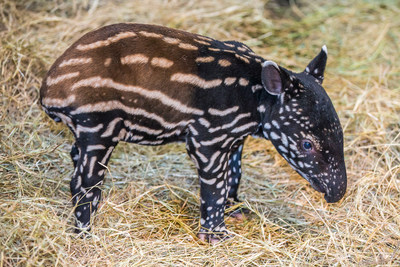
Christmas came early at ZooTampa at Lowry Park, where a new bundle of joy just arrived. Ubi, an endangered Malayan tapir, delivered a healthy fourth calf early in the morning on December 17.
The new calf is the 12th Malayan Tapir born at ZooTampa. With less than 50 Malayan tapirs in human care in North America, this birth is critical to securing a safety net for a species facing extinction.
The animal care and medical care team were able to monitor Ubi’s pregnancy over the year. While tapirs (pronounced TEY-per) are usually solitary by nature, the animal care team at the Zoo developed a strong bond with Ubi, ensuring she was comfortable as she received prenatal care from the medical team. Luckily for her, this meant she received belly scratches from her keepers while the medical care team conducted ultrasounds regularly. Zoo officials are delighted that mom and baby are healthy and thriving.
“We are thrilled to welcome another Zoo baby! The successful tapir birth signifies that ZooTampa at Lowry Park has once again contributed to the long-term sustainability of this unique species on the brink of extinction,” said Chris Massaro, General Curator.
The Malayan tapir, though sometimes mistaken for a relative of a pig or anteater, is a close relative of the rhinoceros and horse. A Tapir calf will have a very distinctive coat pattern when first born, made up of a series of spots and stripes to help camouflage the baby. This coat pattern will slowly change over six months to the unique black and white pattern of the parents. Known as “living fossils,” this unique, endangered species is the most primitive large mammal in the world, dating back to 20 million years ago. Due to hunting and habitat loss, numbers continue to decline.
Guests will be able to see the new calf on habitat, though she is still staying close to mom, nursing and growing. The calf will share the habitat with her father, “Albert.” During the day, visitors can watch the other tapirs using their snouts and excellent sense of smell to sniff out their favorite treats – like smeared bananas.
The Zoo will keep guests informed on updates regarding the new baby and when she will be introduced to the tapir habitat through the Zoo’s social media channels.
SOURCE ZooTampa at Lowry Park












